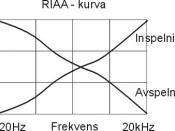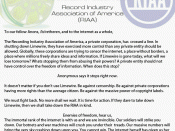This paper explores the ethics illustrated by the Recording Industry Association of America (RIAA) and the people who download music from the Internet. It focuses on discussing the concerns that arise when certain threatening technology is developed and implemented. In this case, the RIAA is apparently willing to take great measures, with questionable ethics, in challenging this technology rather than embracing it.
Problem
The Recording Industry Association of America alleges that pirated music and video is costing the industry millions of dollars per year. It is possible that the RIAA is violating our civil rights in their pursuit of people who download or share files online. The introduction of new technology has provided a mechanism that brought the problem to the forefront as the global distribution of content is rapidly achievable and difficult for the RIAA to control.
Analysis
The RIAA has launched an all-out war to stop online file sharing activities.
This war began with lawsuits against the companies that wrote and provided the software that enabled file sharing to proliferate. These applications, including Napster, Morpheus, and Kazaa, operate by creating a network of computers that can attach to another computer and display a directory of shared files. The users can download these files directly to their own computer using a peer-to-peer connection. Since the connections are peer-to-peer, it is difficult to know who is connected to whom and virtually impossible to hold a single entity responsible for these activities.
The RIAA and Motion Picture Association of America (MPAA) have attempted several tactics to stop this piracy. They realized that the vendors of file sharing software could not be stopped because they were not breaking any laws. After concluding that it was the end users who were breaking the laws, they subsequently redirected their attacks to the handful of...


